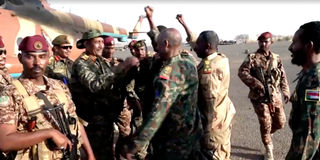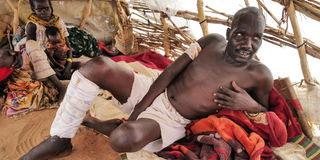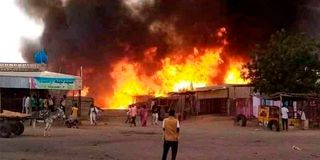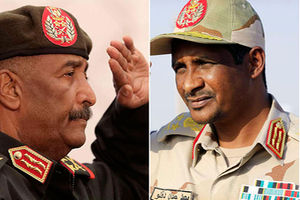
A Sudanese army soldier stands next to a destroyed combat vehicle as Sudan's army retakes ground and some displaced residents return to ravaged capital in the state of Khartoum Sudan March 26, 2025.
Sudan’s war, a conflict between the Armed Forces (SAF) and the Rapid Support Forces (RSF), is entering its third year this week. Yet warring factions have turned it into an orgy of atrocities against non-combatants, killing tens of thousands of villagers and routing millions of others from their homes.
By this week, the death toll had crossed 33,000 people, according to various volunteer war monitors. Some 12 million had been displaced and more than half of the country’s population was now exposed to hunger.
It is a burden both armed sides may carry. Last month, the SAF won back the capital, Khartoum, providing a signal of hope for normalcy and safety. But then videos emerged of how allied militia were just as brutal. The Khartoum Emergency Response Rooms (ERR), a community-based war monitoring group, shared videos of people being beheaded, shot, dragged from hospital beds or just chained.
One video from the area shows a man with a cast and surgical pins on his leg being dragged through the street by a group of soldiers believed to belong to a SAF affiliate. The men interrogated the victim, shooting him at close range. In another incident, a SAF-clad soldier beheaded a man, held his head aloft and hurled it in a ditch.

Sudan's army chief Abdel Fattah al-Burhan is greeted by military officials after disembarking from a helicopter, in the capital Khartoum, Sudan March 26, 2025.
Avaaz, a US-based war monitoring group that works with the ERR said it had geolocated the incidents in Khartoum, just a day after the SAF retook the city from SAF. Other incidents showed soldiers shooting at unarmed people believed to have collaborated with the RSF when they ran the city until March 25. Nation.Africa will not publish the videos because they are too graphic.
A spokesperson for the SAF denied the atrocities but suggested the army has collaborated with autonomous militia “to defend our country” and who may have had excesses. He said the SAF would investigate.

Displaced people fleeing from al-Jazirah state arrive in Gedaref in the east of war-torn Sudan on December 22, 2023.
The Emergency Lawyers human rights group in Sudan said the SAF has avenged RSF excesses by using the same tools, by striking villages associated with people siding with RSF.
A statement from the lawyers said that such a strike “targeted an area densely populated with civilians” and constituted a “systematic war crime.” It said SAF was “fully responsible” and called for an independent investigation to “ensure that those responsible for these crimes are held accountable before international courts”.
Yet Sudan’s brutal war has been a pendulum of violence, atrocities swung by both sides. This week, rights watchdog Amnesty International said the Rapid Support Forces (RSF) has inflicted widespread sexual violence on women and girls throughout Sudan’s two-year civil war.
Sexual violence
Amnesty’s report, They raped all of us: Sexual violence against women and girls in Sudan, documents RSF soldiers raping or gang-raping 36 women and girls as young as 15. It also includes other forms of sexual violence, in four Sudanese states between April 2023 and October 2024.
Incidents showed gangs raping a mother after tearing away her breastfeeding baby and the 30-day sexual enslavement of another woman in Khartoum. There were also beatings, torture with hot liquid or sharp blades, and murder.

Adam Abdullah, 45, who survived because he pretended to be dead when Rapid Support Forces (RSF) attacked the hospital where he was being treated, speaks as he sits with his daughters inside their makeshift shelter in Adre, Chad July 27, 2023.
“The world must act to stop the RSF’s atrocities by stemming the flow of weapons into Sudan, pressuring the leadership to end sexual violence, and holding perpetrators including top commanders to account,” said Deprose Muchena, Amnesty International Senior Director for Regional Human Rights Impact.
Amnesty said it interviewed 30 people, mostly survivors and relatives of survivors in Ugandan refugee camps. All survivors and witnesses identified RSF fighters as perpetrators.
“The world has failed to protect civilians, provide sufficient humanitarian aid or hold perpetrators accountable for these crimes. It’s time for people and governments around the world to establish the truth of what has happened in Sudan, bring suspected perpetrators to justice and provide reparations and comprehensive sexual and reproductive health care to survivors.”

A man stands by as a fire rages in a livestock market area in al-Fasher, the capital of Sudan's North Darfur state, on September 1, 2023, in the aftermath of bombardment by the paramilitary Rapid Support Forces (RSF).
The use of violence against civilians seems to have been a tool adopted by either side to blackmail people for support. So far, the RSF has been sanctioned for genocide while the SAF has been sanctioned for war crimes including the use of violence to advance its stay in power. The sanctions haven’t been enough. And aid workers warned this week that the situation in Sudan could cut down entire families even if the war ends.
"Two years of grinding conflict have pushed families in Sudan to the brink: they are exhausted, starving and running out of options. Children are dying daily from malnutrition,” said Tjada D'Oyen McKenna, CEO of charity group Mercy Corps.
"Sudan cannot afford continued inaction. Urgent support is needed to save lives. Without immediate, large-scale support to deliver food, water, and medical care, millions may starve. The people of Sudan are not statistics. They are mothers, fathers, and children pleading to be seen, heard, and helped before it's too late."
In Sudan, aid workers say they need $4.1 billion required to meet the needs of 20.9 million people. Just six per cent of that has been sent in. McKenna said funding was shrinking while needs are spiralling.
Humanitarian catastrophe
This week, the United Nations High Commissioner for Human Rights, Volker Türk sounded the alarm over the devastating impact of the conflict, warning that continued international inaction risks enabling further atrocities and a worsening humanitarian catastrophe.
In a statement issued from Geneva on Friday, Türk said Sudan’s warring parties are waging “a full-scale assault on human rights” while the world stands by.

Refugees from war-torn Sudan hold a sit-in seeking support in front of the United Nation High Commissioner for Refugees (UNHCR) offices in Tripoli, on July 15, 2023.
“Over the past year, the intensifying violence has torn apart the lives and hopes of millions of Sudanese people, trapping them in a nightmare of death, deprivation, and despair,” he said. “Two years of this brutal and senseless war must serve as a wake-up call. Sudan cannot remain on this destructive path.”
Türk emphasized that the conflict is not simply a power struggle but is also driven by local and international economic interests—particularly in the gold trade and agriculture. He warned that revenues from gold, Arabic gum, and livestock exports are fueling the war economy, and called for increased scrutiny of how these sectors are sustaining the violence.
He also raised deep concern over the continued flow of weapons into Sudan, including to Darfur, which remains under a UN arms embargo. “All parties facilitating the transfer of arms and military equipment into Darfur must stop immediately,” he said, calling for the embargo to be extended nationwide.






